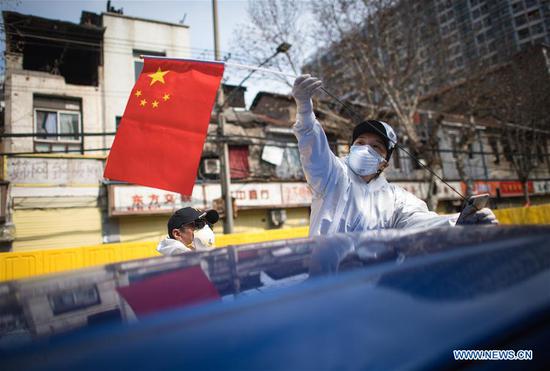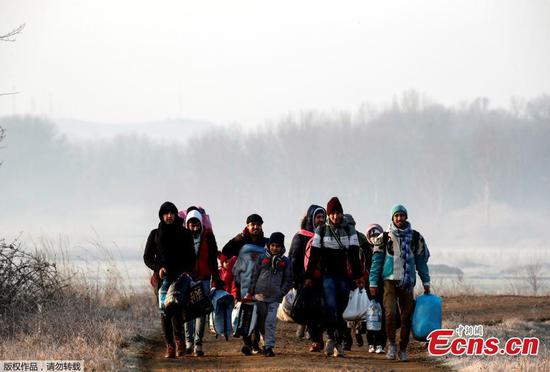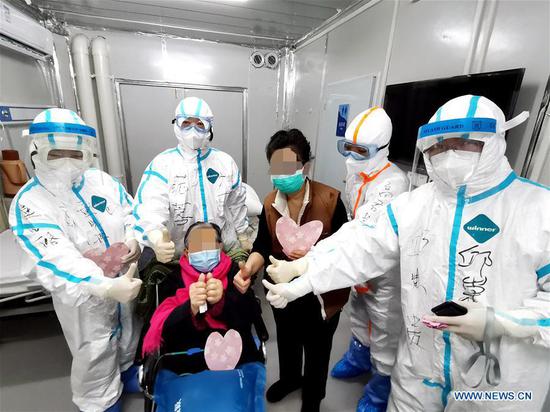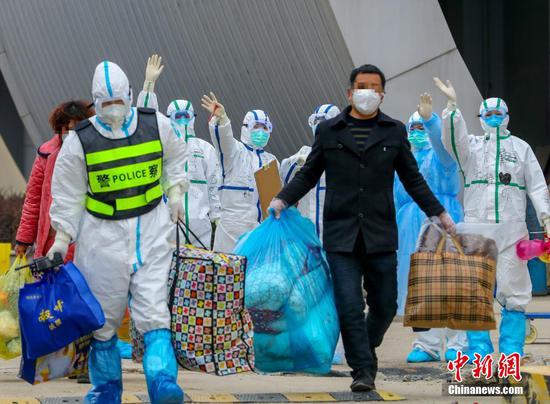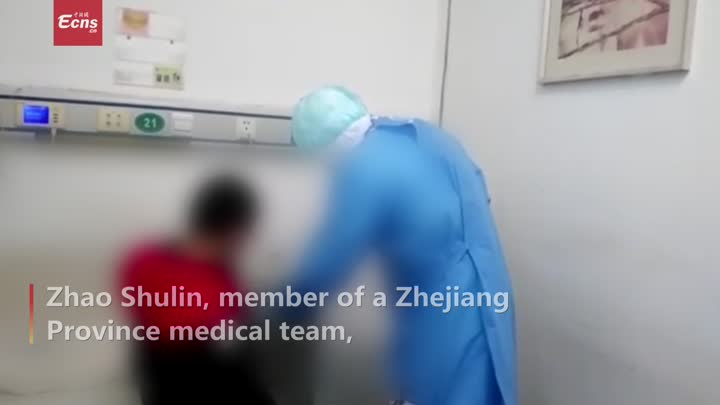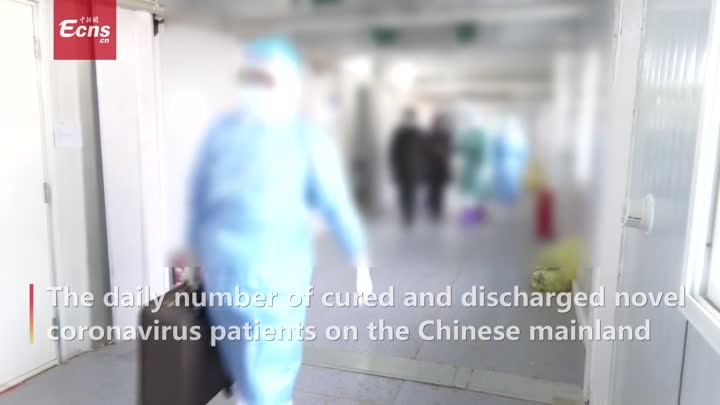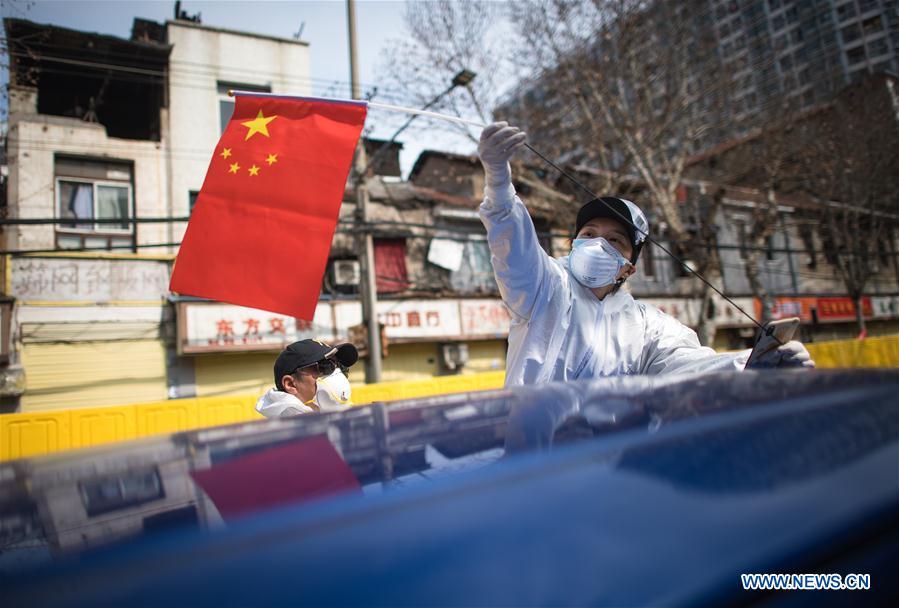
Wang Ziyi, head of the volunteer group "Wuhan Emergency Team", installs a national flag on the car in Wuhan, central China's Hubei Province, Feb. 29, 2020. In the early morning of Feb. 29, volunteer Wang Zhen drove out of his community immediately after receiving a call for help from a pregnant woman who lived 30 kilometers away at another community in Wuhan. Wang took the pregnant woman and her family to the Wuhan Maternal and Child Health Hospital, where the woman later safely gave birth to her baby. On Jan. 23, Wang Zhen, a computer programmer, joined a WeChat group named "Wuhan Emergency Team", which also consists of Wang Ziyi, Li Wenjian, Zhu Wei and Yang Xuebin. Their main work is taking pregnant women without access to vehicles to the hospital. With their help, 23 pregnant women have been safely sent to the hospital so far and given birth to their children, with no one contracting the novel coronavirus. Since 23 January, the Wuhan Maternal and Child Health Hospital has mobilized all its 2,500 staff to successfully help more than 1,100 pregnant women deliver their babies. (Xinhua/Xiao Yijiu)
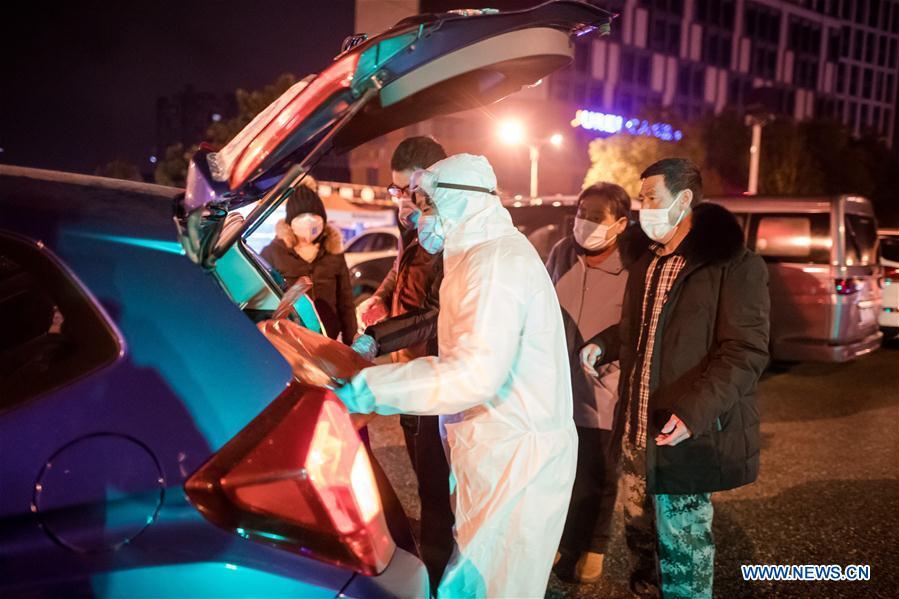
Volunteer Wang Zhen helps pregnant woman Liu Ting's family with luggage in Wuhan, central China's Hubei Province, early Feb. 29, 2020. In the early morning of Feb. 29, volunteer Wang Zhen drove out of his community immediately after receiving a call for help from a pregnant woman who lived 30 kilometers away at another community in Wuhan. Wang took the pregnant woman and her family to the Wuhan Maternal and Child Health Hospital, where the woman later safely gave birth to her baby. On Jan. 23, Wang Zhen, a computer programmer, joined a WeChat group named "Wuhan Emergency Team", which also consists of Wang Ziyi, Li Wenjian, Zhu Wei and Yang Xuebin. Their main work is taking pregnant women without access to vehicles to the hospital. With their help, 23 pregnant women have been safely sent to the hospital so far and given birth to their children, with no one contracting the novel coronavirus. Since 23 January, the Wuhan Maternal and Child Health Hospital has mobilized all its 2,500 staff to successfully help more than 1,100 pregnant women deliver their babies. (Xinhua/Xiao Yijiu)
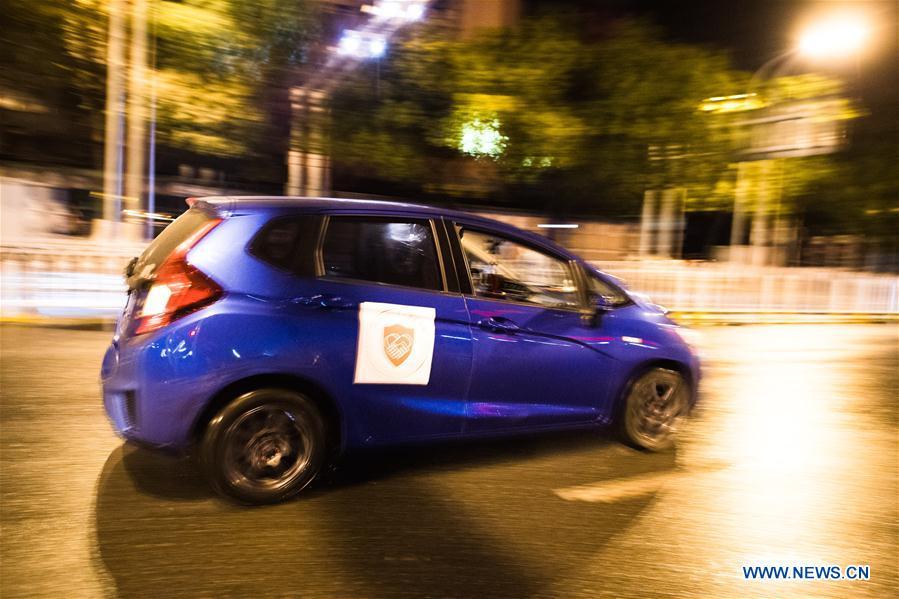
Volunteer Wang Zhen drives pregnant woman Liu Ting to Wuhan Maternal and Child Health Hospital in Wuhan, central China's Hubei Province, early Feb. 29, 2020. In the early morning of Feb. 29, volunteer Wang Zhen drove out of his community immediately after receiving a call for help from a pregnant woman who lived 30 kilometers away at another community in Wuhan. Wang took the pregnant woman and her family to the Wuhan Maternal and Child Health Hospital, where the woman later safely gave birth to her baby. On Jan. 23, Wang Zhen, a computer programmer, joined a WeChat group named "Wuhan Emergency Team", which also consists of Wang Ziyi, Li Wenjian, Zhu Wei and Yang Xuebin. Their main work is taking pregnant women without access to vehicles to the hospital. With their help, 23 pregnant women have been safely sent to the hospital so far and given birth to their children, with no one contracting the novel coronavirus. Since 23 January, the Wuhan Maternal and Child Health Hospital has mobilized all its 2,500 staff to successfully help more than 1,100 pregnant women deliver their babies. (Xinhua/Xiao Yijiu)
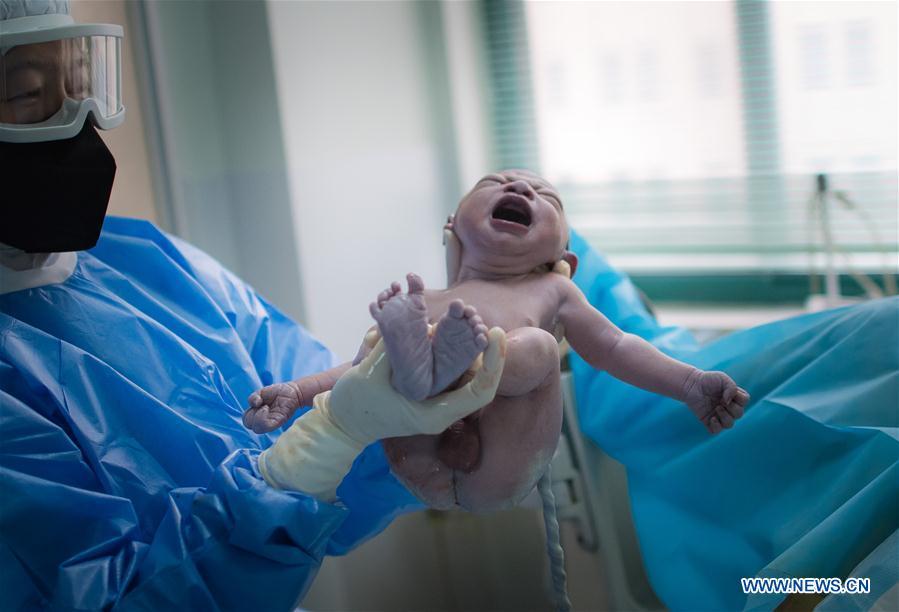
Midwife Wu Dan takes the newborn to the mother Liu Ting at the delivery room of Wuhan Maternal and Child Health Hospital in Wuhan, central China's Hubei Province, March 1, 2020. In the early morning of Feb. 29, volunteer Wang Zhen drove out of his community immediately after receiving a call for help from a pregnant woman who lived 30 kilometers away at another community in Wuhan. Wang took the pregnant woman and her family to the Wuhan Maternal and Child Health Hospital, where the woman later safely gave birth to her baby. On Jan. 23, Wang Zhen, a computer programmer, joined a WeChat group named "Wuhan Emergency Team", which also consists of Wang Ziyi, Li Wenjian, Zhu Wei and Yang Xuebin. Their main work is taking pregnant women without access to vehicles to the hospital. With their help, 23 pregnant women have been safely sent to the hospital so far and given birth to their children, with no one contracting the novel coronavirus. Since 23 January, the Wuhan Maternal and Child Health Hospital has mobilized all its 2,500 staff to successfully help more than 1,100 pregnant women deliver their babies. (Xinhua/Xiao Yijiu)
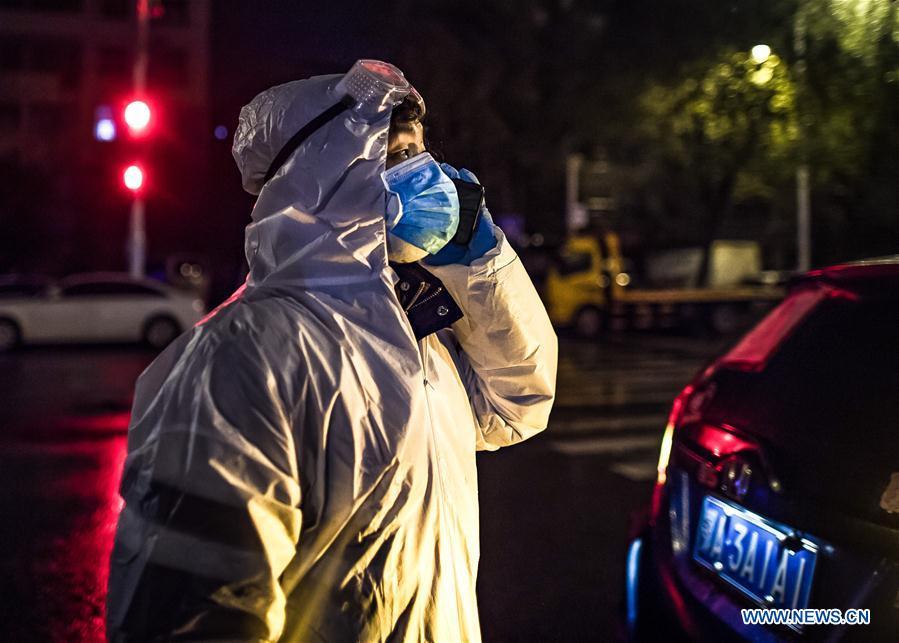
Volunteer Wang Zhen contacts with pregnant woman Liu Ting's family after arriving at her community in Wuhan, central China's Hubei Province, early Feb. 29, 2020. In the early morning of Feb. 29, volunteer Wang Zhen drove out of his community immediately after receiving a call for help from a pregnant woman who lived 30 kilometers away at another community in Wuhan. Wang took the pregnant woman and her family to the Wuhan Maternal and Child Health Hospital, where the woman later safely gave birth to her baby. On Jan. 23, Wang Zhen, a computer programmer, joined a WeChat group named "Wuhan Emergency Team", which also consists of Wang Ziyi, Li Wenjian, Zhu Wei and Yang Xuebin. Their main work is taking pregnant women without access to vehicles to the hospital. With their help, 23 pregnant women have been safely sent to the hospital so far and given birth to their children, with no one contracting the novel coronavirus. Since 23 January, the Wuhan Maternal and Child Health Hospital has mobilized all its 2,500 staff to successfully help more than 1,100 pregnant women deliver their babies. (Xinhua/Xiao Yijiu)
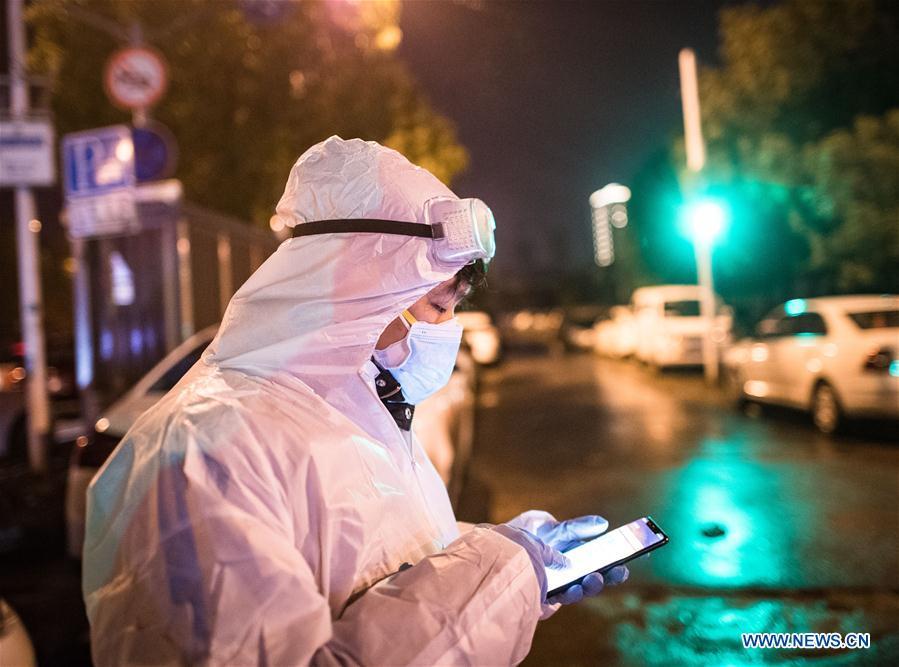
Volunteer Wang Zhen reports his position after arriving at an agreed place in Wuhan, central China's Hubei Province, early Feb. 29, 2020. In the early morning of Feb. 29, volunteer Wang Zhen drove out of his community immediately after receiving a call for help from a pregnant woman who lived 30 kilometers away at another community in Wuhan. Wang took the pregnant woman and her family to the Wuhan Maternal and Child Health Hospital, where the woman later safely gave birth to her baby. On Jan. 23, Wang Zhen, a computer programmer, joined a WeChat group named "Wuhan Emergency Team", which also consists of Wang Ziyi, Li Wenjian, Zhu Wei and Yang Xuebin. Their main work is taking pregnant women without access to vehicles to the hospital. With their help, 23 pregnant women have been safely sent to the hospital so far and given birth to their children, with no one contracting the novel coronavirus. Since 23 January, the Wuhan Maternal and Child Health Hospital has mobilized all its 2,500 staff to successfully help more than 1,100 pregnant women deliver their babies. (Xinhua/Xiao Yijiu)
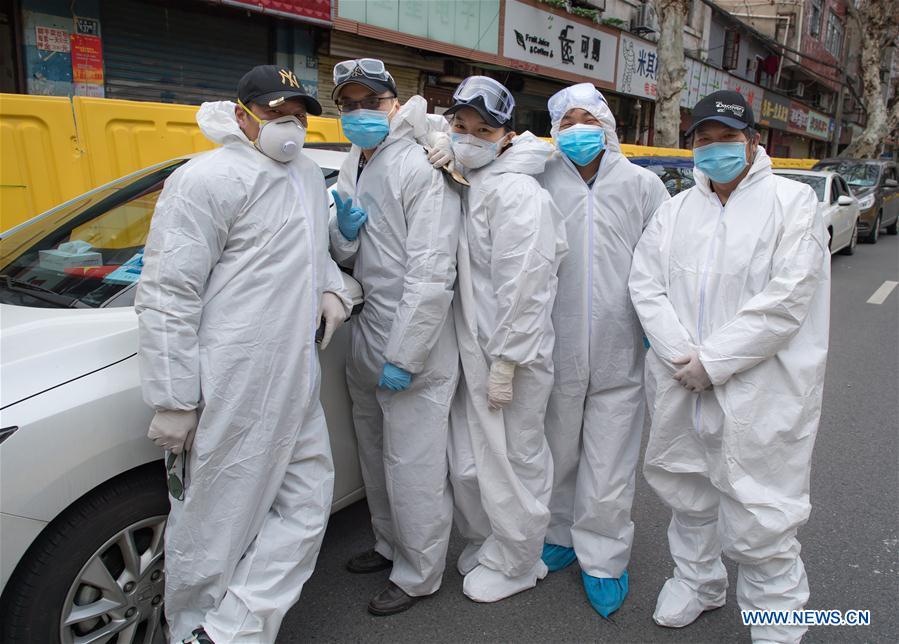
Li Wejian, Zhu Wei, Wang Ziyi, Wang Zhen and Yang Xuebin (L to R), members of the volunteer group "Wuhan Emergency Team", pose for a group photo before the car in Wuhan, central China's Hubei Province, Feb. 29, 2020. In the early morning of Feb. 29, volunteer Wang Zhen drove out of his community immediately after receiving a call for help from a pregnant woman who lived 30 kilometers away at another community in Wuhan. Wang took the pregnant woman and her family to the Wuhan Maternal and Child Health Hospital, where the woman later safely gave birth to her baby. On Jan. 23, Wang Zhen, a computer programmer, joined a WeChat group named "Wuhan Emergency Team", which also consists of Wang Ziyi, Li Wenjian, Zhu Wei and Yang Xuebin. Their main work is taking pregnant women without access to vehicles to the hospital. With their help, 23 pregnant women have been safely sent to the hospital so far and given birth to their children, with no one contracting the novel coronavirus. Since 23 January, the Wuhan Maternal and Child Health Hospital has mobilized all its 2,500 staff to successfully help more than 1,100 pregnant women deliver their babies. (Xinhua/Xiao Yijiu)
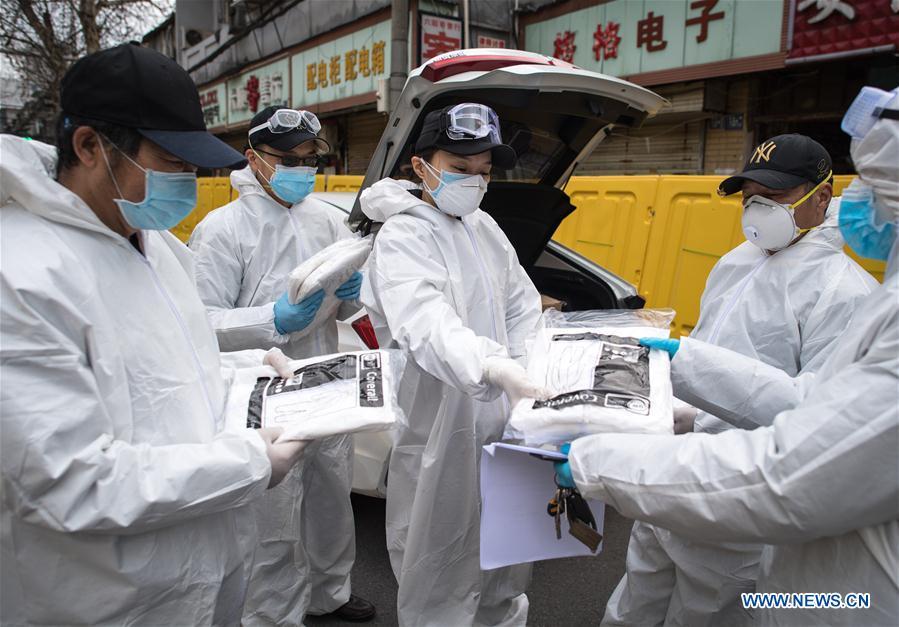
Wang Ziyi (C), head of the volunteer group "Wuhan Emergency Team", hands out protective suits to the group's members in Wuhan, central China's Hubei Province, Feb. 29, 2020. In the early morning of Feb. 29, volunteer Wang Zhen drove out of his community immediately after receiving a call for help from a pregnant woman who lived 30 kilometers away at another community in Wuhan. Wang took the pregnant woman and her family to the Wuhan Maternal and Child Health Hospital, where the woman later safely gave birth to her baby. On Jan. 23, Wang Zhen, a computer programmer, joined a WeChat group named "Wuhan Emergency Team", which also consists of Wang Ziyi, Li Wenjian, Zhu Wei and Yang Xuebin. Their main work is taking pregnant women without access to vehicles to the hospital. With their help, 23 pregnant women have been safely sent to the hospital so far and given birth to their children, with no one contracting the novel coronavirus. Since 23 January, the Wuhan Maternal and Child Health Hospital has mobilized all its 2,500 staff to successfully help more than 1,100 pregnant women deliver their babies. (Xinhua/Xiao Yijiu)
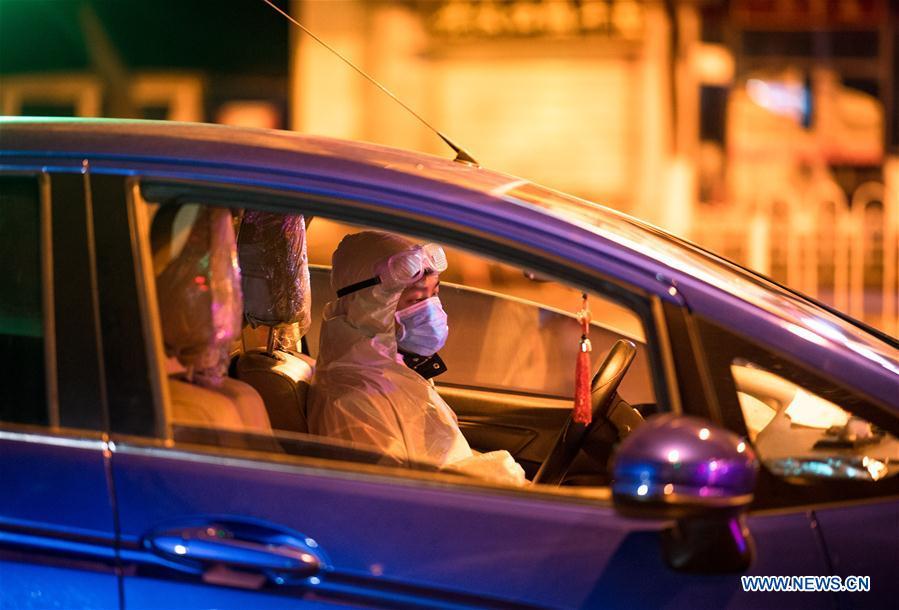
Volunteer Wang Zhen looks at navigator in the car in Wuhan, central China's Hubei Province, early Feb. 29, 2020. In the early morning of Feb. 29, volunteer Wang Zhen drove out of his community immediately after receiving a call for help from a pregnant woman who lived 30 kilometers away at another community in Wuhan. Wang took the pregnant woman and her family to the Wuhan Maternal and Child Health Hospital, where the woman later safely gave birth to her baby. On Jan. 23, Wang Zhen, a computer programmer, joined a WeChat group named "Wuhan Emergency Team", which also consists of Wang Ziyi, Li Wenjian, Zhu Wei and Yang Xuebin. Their main work is taking pregnant women without access to vehicles to the hospital. With their help, 23 pregnant women have been safely sent to the hospital so far and given birth to their children, with no one contracting the novel coronavirus. Since 23 January, the Wuhan Maternal and Child Health Hospital has mobilized all its 2,500 staff to successfully help more than 1,100 pregnant women deliver their babies. (Xinhua/Xiao Yijiu)

Volunteer Wang Zhen reports his position after arriving at an agreed place in Wuhan, central China's Hubei Province, early Feb. 29, 2020. In the early morning of Feb. 29, volunteer Wang Zhen drove out of his community immediately after receiving a call for help from a pregnant woman who lived 30 kilometers away at another community in Wuhan. Wang took the pregnant woman and her family to the Wuhan Maternal and Child Health Hospital, where the woman later safely gave birth to her baby. On Jan. 23, Wang Zhen, a computer programmer, joined a WeChat group named "Wuhan Emergency Team", which also consists of Wang Ziyi, Li Wenjian, Zhu Wei and Yang Xuebin. Their main work is taking pregnant women without access to vehicles to the hospital. With their help, 23 pregnant women have been safely sent to the hospital so far and given birth to their children, with no one contracting the novel coronavirus. Since 23 January, the Wuhan Maternal and Child Health Hospital has mobilized all its 2,500 staff to successfully help more than 1,100 pregnant women deliver their babies. (Xinhua/Xiao Yijiu)
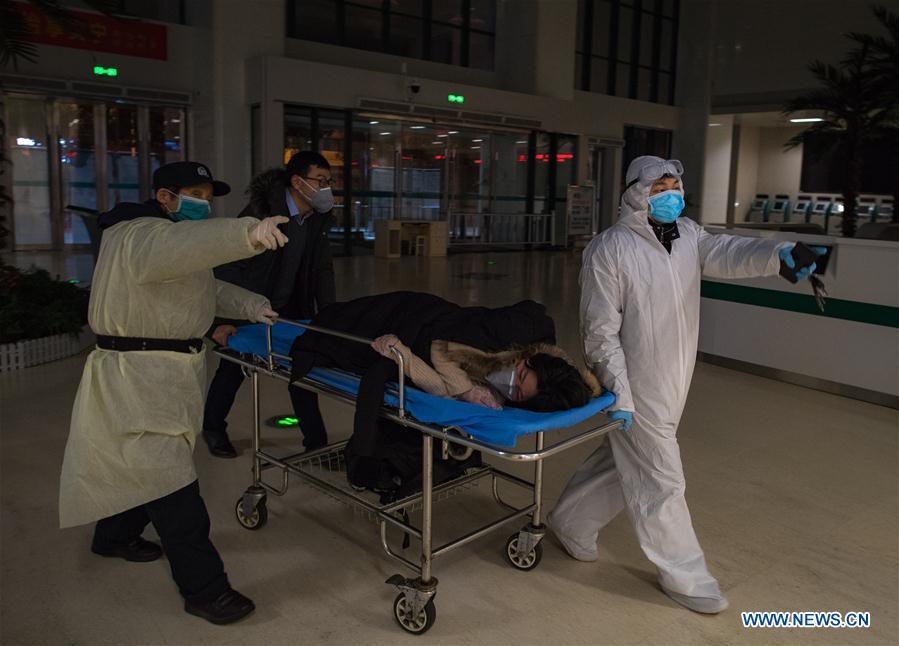
Volunteer Wang Zhen (1st R) helps send pregnant woman Liu Ting to the CT room for examination at Wuhan Maternal and Child Health Hospital in Wuhan, central China's Hubei Province, early Feb. 29, 2020. In the early morning of Feb. 29, volunteer Wang Zhen drove out of his community immediately after receiving a call for help from a pregnant woman who lived 30 kilometers away at another community in Wuhan. Wang took the pregnant woman and her family to the Wuhan Maternal and Child Health Hospital, where the woman later safely gave birth to her baby. On Jan. 23, Wang Zhen, a computer programmer, joined a WeChat group named "Wuhan Emergency Team", which also consists of Wang Ziyi, Li Wenjian, Zhu Wei and Yang Xuebin. Their main work is taking pregnant women without access to vehicles to the hospital. With their help, 23 pregnant women have been safely sent to the hospital so far and given birth to their children, with no one contracting the novel coronavirus. Since 23 January, the Wuhan Maternal and Child Health Hospital has mobilized all its 2,500 staff to successfully help more than 1,100 pregnant women deliver their babies. (Xinhua/Xiao Yijiu)
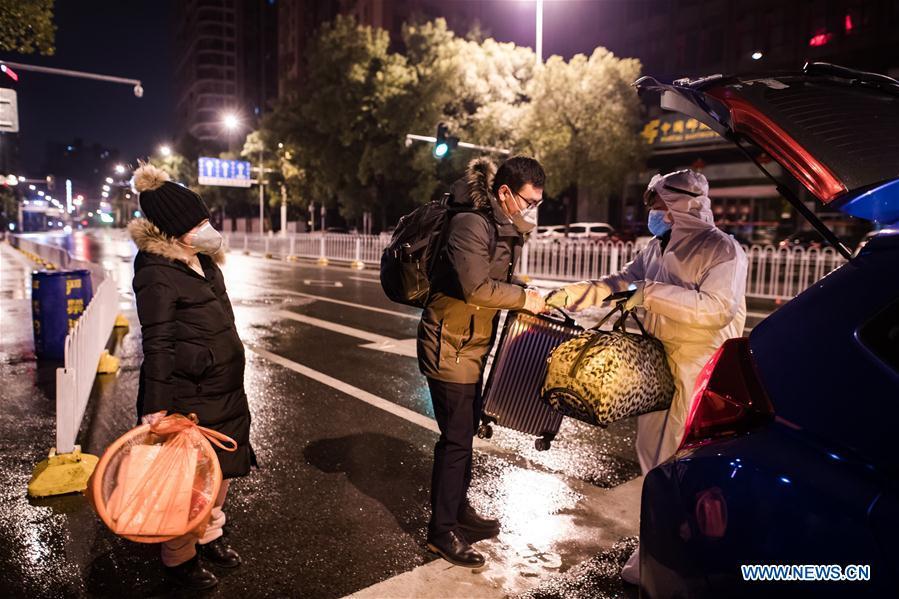
Volunteer Wang Zhen helps pregnant woman Liu Ting and her family with luggage after arriving at Wuhan Maternal and Child Health Hospital in Wuhan, central China's Hubei Province, early Feb. 29, 2020. In the early morning of Feb. 29, volunteer Wang Zhen drove out of his community immediately after receiving a call for help from a pregnant woman who lived 30 kilometers away at another community in Wuhan. Wang took the pregnant woman and her family to the Wuhan Maternal and Child Health Hospital, where the woman later safely gave birth to her baby. On Jan. 23, Wang Zhen, a computer programmer, joined a WeChat group named "Wuhan Emergency Team", which also consists of Wang Ziyi, Li Wenjian, Zhu Wei and Yang Xuebin. Their main work is taking pregnant women without access to vehicles to the hospital. With their help, 23 pregnant women have been safely sent to the hospital so far and given birth to their children, with no one contracting the novel coronavirus. Since 23 January, the Wuhan Maternal and Child Health Hospital has mobilized all its 2,500 staff to successfully help more than 1,100 pregnant women deliver their babies. (Xinhua/Xiao Yijiu)
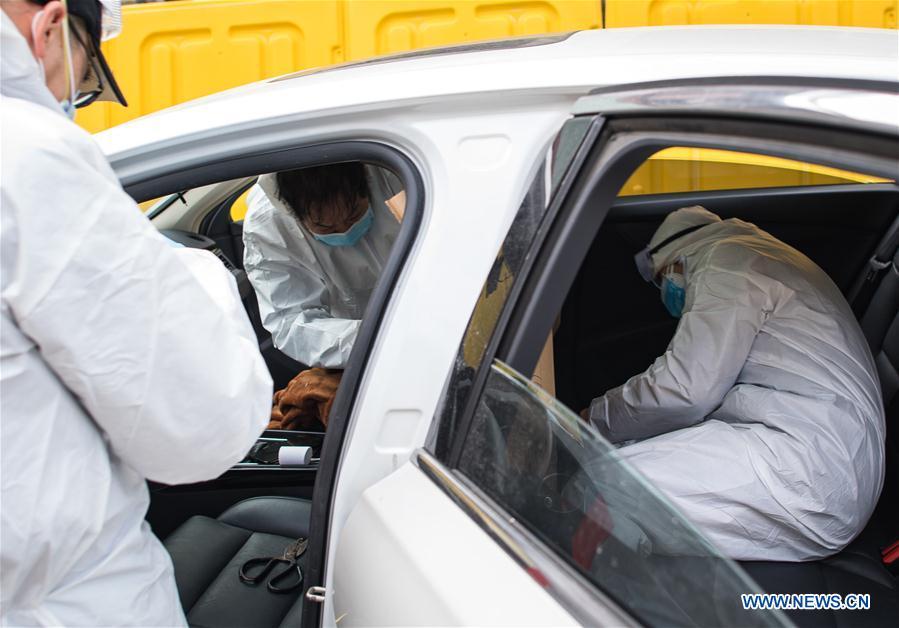
Wang Zhen (R) and Yang Xuebin, members of the volunteer group "Wuhan Emergency Team", install a protective isolation board in the car in Wuhan, central China's Hubei Province, Feb. 29, 2020. In the early morning of Feb. 29, volunteer Wang Zhen drove out of his community immediately after receiving a call for help from a pregnant woman who lived 30 kilometers away at another community in Wuhan. Wang took the pregnant woman and her family to the Wuhan Maternal and Child Health Hospital, where the woman later safely gave birth to her baby. On Jan. 23, Wang Zhen, a computer programmer, joined a WeChat group named "Wuhan Emergency Team", which also consists of Wang Ziyi, Li Wenjian, Zhu Wei and Yang Xuebin. Their main work is taking pregnant women without access to vehicles to the hospital. With their help, 23 pregnant women have been safely sent to the hospital so far and given birth to their children, with no one contracting the novel coronavirus. Since 23 January, the Wuhan Maternal and Child Health Hospital has mobilized all its 2,500 staff to successfully help more than 1,100 pregnant women deliver their babies. (Xinhua/Xiao Yijiu)
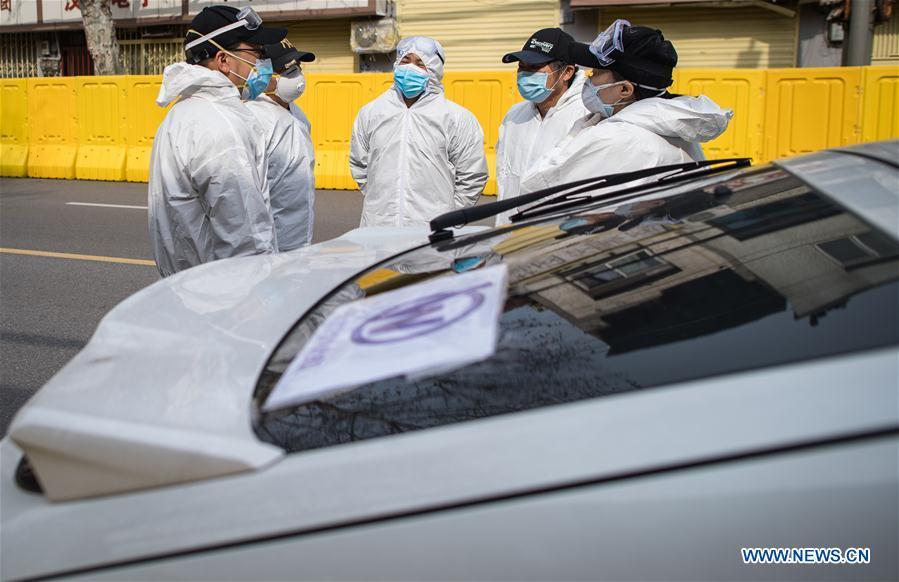
Members of the volunteer group "Wuhan Emergency Team" discuss the use of the car in Wuhan, central China's Hubei Province, Feb. 29, 2020. In the early morning of Feb. 29, volunteer Wang Zhen drove out of his community immediately after receiving a call for help from a pregnant woman who lived 30 kilometers away at another community in Wuhan. Wang took the pregnant woman and her family to the Wuhan Maternal and Child Health Hospital, where the woman later safely gave birth to her baby. On Jan. 23, Wang Zhen, a computer programmer, joined a WeChat group named "Wuhan Emergency Team", which also consists of Wang Ziyi, Li Wenjian, Zhu Wei and Yang Xuebin. Their main work is taking pregnant women without access to vehicles to the hospital. With their help, 23 pregnant women have been safely sent to the hospital so far and given birth to their children, with no one contracting the novel coronavirus. Since 23 January, the Wuhan Maternal and Child Health Hospital has mobilized all its 2,500 staff to successfully help more than 1,100 pregnant women deliver their babies. (Xinhua/Xiao Yijiu)
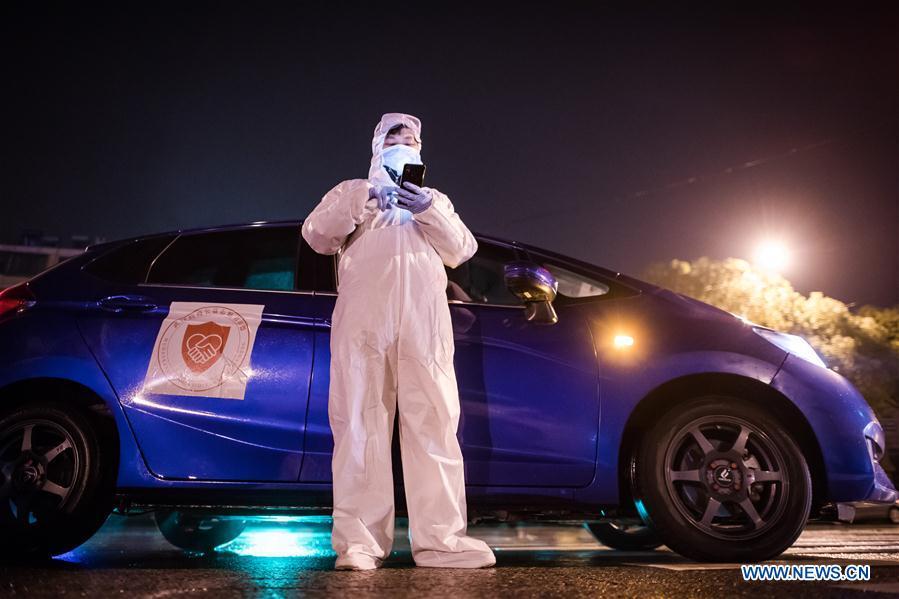
Volunteer Wang Zhen waits at the pregnant woman's community in Wuhan, central China's Hubei Province, early Feb. 29, 2020. In the early morning of Feb. 29, volunteer Wang Zhen drove out of his community immediately after receiving a call for help from a pregnant woman who lived 30 kilometers away at another community in Wuhan. Wang took the pregnant woman and her family to the Wuhan Maternal and Child Health Hospital, where the woman later safely gave birth to her baby. On Jan. 23, Wang Zhen, a computer programmer, joined a WeChat group named "Wuhan Emergency Team", which also consists of Wang Ziyi, Li Wenjian, Zhu Wei and Yang Xuebin. Their main work is taking pregnant women without access to vehicles to the hospital. With their help, 23 pregnant women have been safely sent to the hospital so far and given birth to their children, with no one contracting the novel coronavirus. Since 23 January, the Wuhan Maternal and Child Health Hospital has mobilized all its 2,500 staff to successfully help more than 1,100 pregnant women deliver their babies. (Xinhua/Xiao Yijiu)
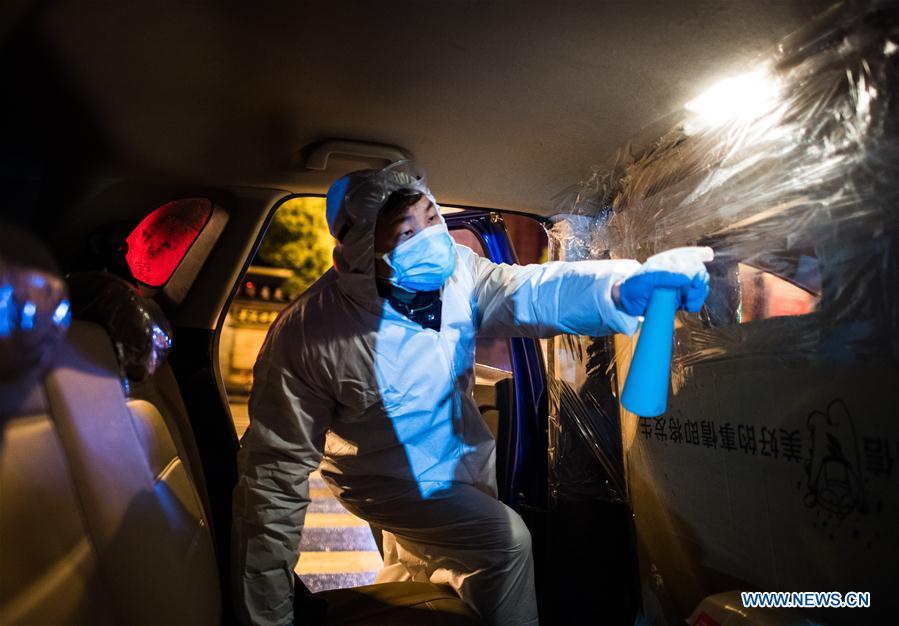
Volunteer Wang Zhen disinfects the car after taking a pregnant woman in Wuhan, central China's Hubei Province, early Feb. 29, 2020. In the early morning of Feb. 29, volunteer Wang Zhen drove out of his community immediately after receiving a call for help from a pregnant woman who lived 30 kilometers away at another community in Wuhan. Wang took the pregnant woman and her family to the Wuhan Maternal and Child Health Hospital, where the woman later safely gave birth to her baby. On Jan. 23, Wang Zhen, a computer programmer, joined a WeChat group named "Wuhan Emergency Team", which also consists of Wang Ziyi, Li Wenjian, Zhu Wei and Yang Xuebin. Their main work is taking pregnant women without access to vehicles to the hospital. With their help, 23 pregnant women have been safely sent to the hospital so far and given birth to their children, with no one contracting the novel coronavirus. Since 23 January, the Wuhan Maternal and Child Health Hospital has mobilized all its 2,500 staff to successfully help more than 1,100 pregnant women deliver their babies. (Xinhua/Xiao Yijiu)










